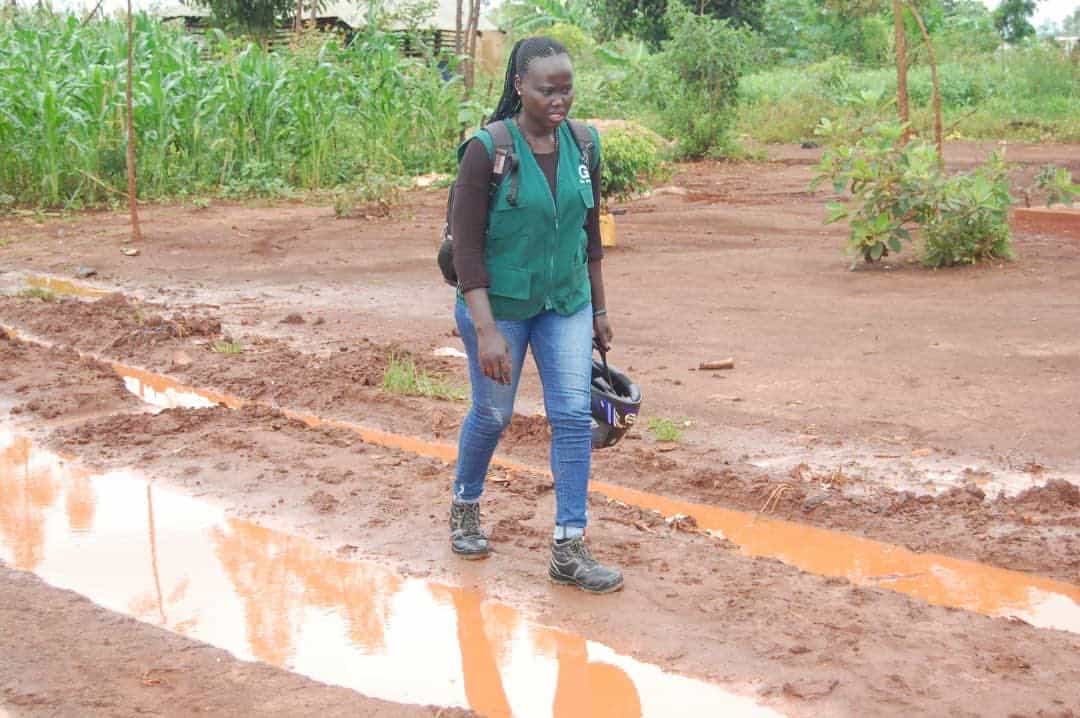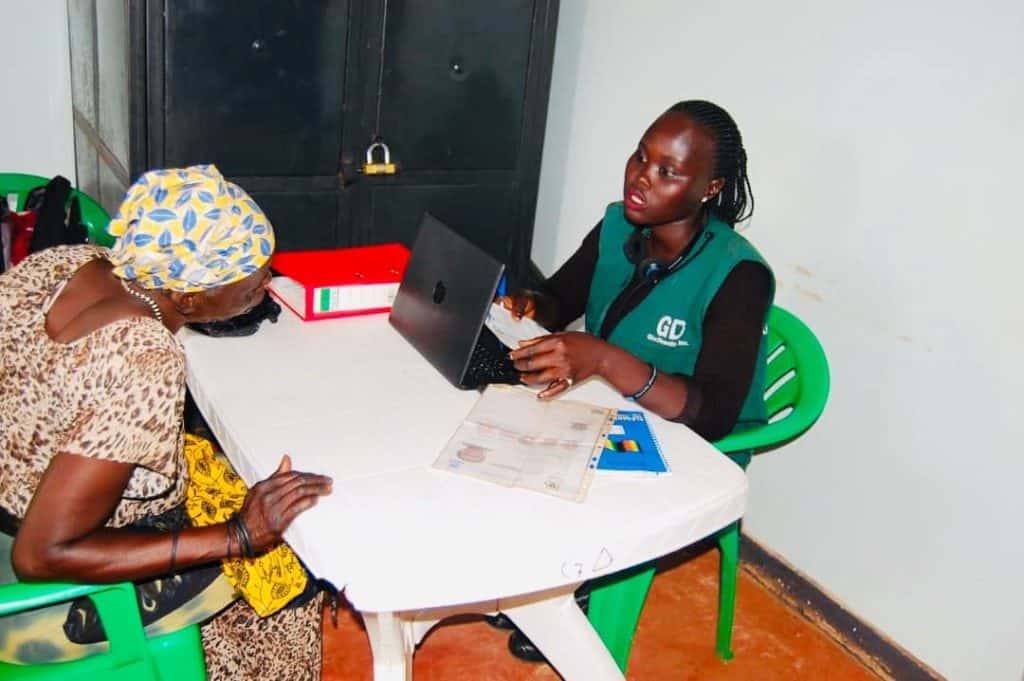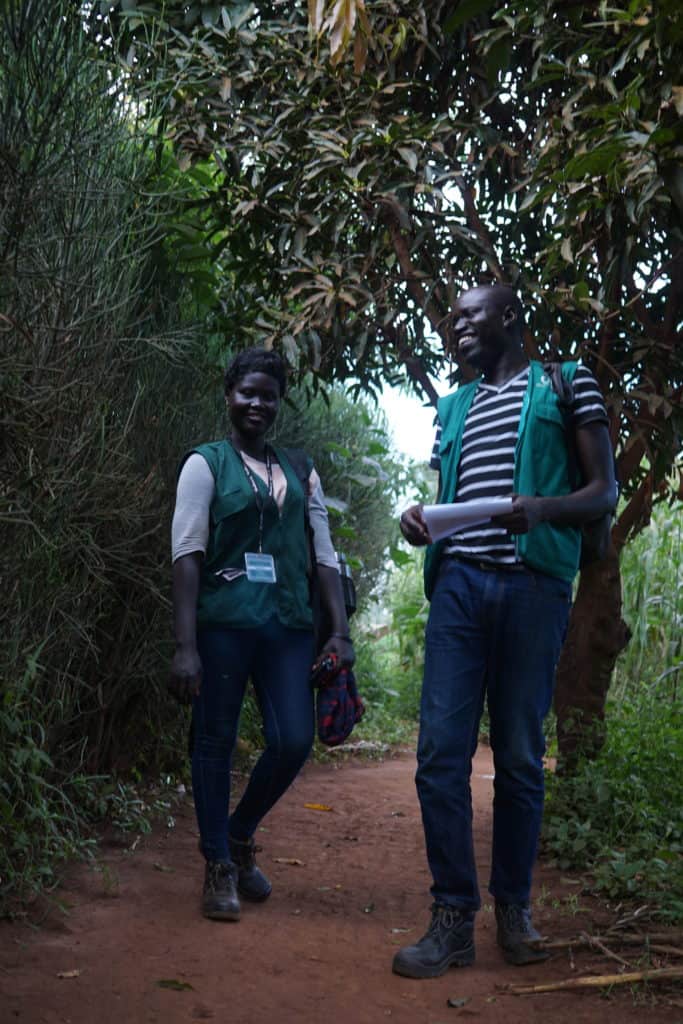
In 2019, GiveDirectly began making payments to approximately 10,000 refugee households (65,000 people) in the Kiryandongo refugee settlement in Uganda, along with 5,000 host community households in the surrounding area. Over the course of two years, GiveDirectly is working alongside independent researchers to conduct a randomized controlled trial to measure the impact of cash transfers in the unique context of a refugee settlement.
About 30% of GiveDirectly staff on the GiveDirectly Kiryandongo refugee team are refugees themselves. One of the field officers who was hired from the Kiryandongo settlement, Ann Chukulu, wrote about what it’s like working as a GiveDirectly field officer in her own home community. The words that follow are written by Ann.
****
Just like any other community in any part of the world, a refugee settlement can be a decent home, especially for someone like me who has never got the chance of growing and living in my home country. I call myself BlissAnn because I always want to be happy despite the challenges I face every single day. The Kiryandongo settlement has always been my home.
I am currently working with GiveDirectly as a Follow-Up Field Officer. My job is to visit recipients who have already received transfers. I usually visit a minimum of 12 households per day and ask a series of 32 questions to make sure that everything went smoothly with their transfer.
30% of GiveDirectly staff here are refugees, too. I’ve seen a lot of different aid organizations come to the settlement over the years, and I’ve never seen an organization hire directly from the community.

Ann assists a recipient in the GiveDirectly’s Kiryandongo office.
My family moved to the refugee settlement when I was three years old. My mum first entered Uganda from Sudan with my elder sister in August 1993 when I was still a baby. We stayed in Koboko at a transit [a temporary camp], called Gweng, for a year and a half. According to my mother, it was the rainy season when we arrived and the condition was not really easy. There was no proper shelter and we were sleeping in a tarpaulin-made house. She said that the wind would always wipe it out, but she never gave up on repairing it. While still at the transit, we were reunited with my maternal uncle and his wife.
Later we were reunited with my father, my stepmother, and half-siblings who had also ran separately during the war. Mum hadn’t known their whereabouts. It was a very exciting period for the entire family to be united again. As for dad, mum said she didn’t have hope of seeing him ever again because while still in Sudan, he was captured, tortured, and detained by rebels. He was working as a store manager with an NGO and the rebels wanted to loot the store, but he denied them the keys. They looked for him and got him. He was saved by a protestant Bishop who pleaded with the rebels to release him.
Life at the transit became more difficult and dad made the decision to move the entire family to a refugee settlement. It was November of 1995 when we moved to the Kiryandongo settlement. I didn’t understand much as I was very young, but one thing I can remember was how difficult it was for us to communicate with the people who had been settled before. The settlement was occupied by mostly the Acholi speakers (from South Sudan) who didn’t know Arabic at all (which is what my family speaks). They were not welcoming toward us. I discovered that as time went on. My mum and dad didn’t know Acholi language, but my stepmother did, and that was the only weapon we had as a family.
There are so many things I didn’t like about living in Kiryandongo. To start with, I hated school. School was a nightmare to me because teachers taught in the Acholi language and I couldn’t understand a thing. So, for example, they assigned items to be brought to school, and since I couldn’t understand, the following day I would get beaten [a common disciplining method at the the time]. That was a routine that made me hate school and teachers. When I left home for school, I did not bother to enter the classroom. That really made my grades to be very low.
Another thing was that, back home, I didn’t like the kind of food we had to feed on. It was really tough because we were not receiving food aid at that time. We had to live in the settlement for a year before we started receiving food aid. Once we did get food aid, that went on for only one good year because our names were erased off the food log in late 1997 with no explanation. Our names were added back on in 2018 when UNHCR conducted a biometric verification of all refugees living in the settlement. That was when we started getting food aid again. My family was used to eating maize flour and a lot of groundnuts, but for many years, we had to eat what we could find in the settlement: red sorghum, millet, and simsim. This diet made life very difficult, especially for us children. We used to dodge meals and I can recall mum trying to convince us to eat. It was upon my parents to hustle real hard and make sure we had food to eat at home; there were times when we could only have one meal in a day. Eventually we got used to the common food at the settlement and in one way that eased the struggle for my parents.
Aside from food, water was another scarce thing in the settlement, and I didn’t like that at all. There was one borehole serving three or four [villages] and there was a lot of congestion and fighting. I used to feel bad seeing my mother having sleepless nights because of water. People spent nights at the borehole sometimes. As for mum, she could wake up at around 2:00 am and hit the road to the borehole and we later joined her around 5:00 am. We would all come back home around midday. That’s the time mum started to fix breakfast “porridge” for us to eat to tide us over until our only substantial meal of the day was ready to eat around 5:00 pm.
Besides all the things I didn’t like, I also had so many other things that I enjoyed about growing up in the settlement. I liked playing games with my friends both at home and at school. Hide and seek was one of them, as was playing cards, “Aweya” (dodgeball), and “Brada” (jump rope). At night we also used to play a lot under the bright moonlight. We told stories to each other, sang songs, and danced until late in the night. I also liked the reading, writing, and number learning lessons from my dad. I learned so many things from my father. He was my teacher and taught all my other siblings, too. He bought books for us and he used to spend most of his time reading stories to us, teaching us mathematics, and helping us practice expressing ourselves in the English language.

Ann with her coworker, Mark, after visiting with a recipient.
Over my lifetime in the settlement, I have witnessed various changes. Medical health has tremendously improved. Now a lot can be done at the settlement health center compared to before. Many water points have been constructed and some of the boreholes have been changed to taps. Some people even have taps in their compounds. The education system has improved. Qualified teachers are being hired and now English is the official language used at school. Roads have been opened, linking the settlement to the nearest town, and the main mode of transport has changed from bicycles to motorcycles and cars. The markets are no longer empty. Very few people nowadays sleep in grass-thatched houses.
Many humanitarian organizations have come to the settlement over the years with unique forms of aid like money, food, medical health, and education. They’ve given out home items like utensils, basins, and jerry cans. Most of the organizations haven’t been so successful because they target a particular group of people, not every household. But food aid has been done differently: after UNHCR’s 2018 verification exercise, every household is now getting food monthly from the World Food Program, making it a successful form of aid. Another successful aid is the unconditional cash transfers by GiveDirectly. I’m seeing its fruits right at the start of the project. I believe giving refugees cash is one of the best aid forms because they can choose to address their most pressing needs and most of them require money over non-monetary aid or assistance.
Being a refugee employee for GiveDirectly, I am being treated by the organization just like any other national worker. And being a refugee employee for GiveDirectly is a plus because I have followed up on many recipients who know that I am from this community. They interact with me so freely in the language they prefer (I speak English, Juba Arabic, Acholi, Luganda, and understand Kakwa so I’m able to communicate with many people). They also feel good about the fact that even their own from the community can be hired.
My favorite part of my job is when I am following up on recipients who have successfully received money. They are so welcoming and the excitement they show me keeps me smiling throughout my day. I like hearing how they have spent the money and what their plans are for their next transfers. This really tells me that GiveDirectly had really come at the right time in the Kiryandongo settlement.
I can’t see what’s next for my career and that is the saddest part of everything. I don’t want to even think about it, but it does run in my mind. Maybe if other organizations also adopt the way GiveDirectly hires I will be able to continue working in Kiryandongo. Otherwise I don’t see anything good. But I have faith.
Interesting! This section especially caught my eye, because it represents so many different forms of development all coming together to create (relative) prosperity:
This paragraph includes healthcare, education, industrial development, technological advances, and improvements to the water system. It brings to mind what I know of the Millennium Village project, but with (perhaps?) more success. In this case, I’m not sure how many of these advances were centrally planned to be synergistic (vs. lots of small projects adding up over time, or the general effects of economic growth). I wonder which advances preceded others (roads probably help the markets stay full; has better health also enabled educational improvements?).